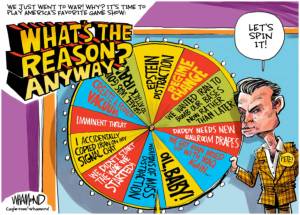Expand gun tax across state
Published 2:08 pm Thursday, December 24, 2015
It hasn’t been the best of years for opponents of even modest measures to address gun violence in Washington state.
This spring, a U.S. District Court judge threw out a challenge to I-594, the initiative that passed in 2014 with 59 percent voter approval to extend the state’s existing background check law to create a universal requirement for all firearm sales, including online sales and gun shows as well as gifts and transfers of firearms.
Last week, a King County Superior Court judge dismissed a suit by the National Rifle Association and other gun ownership groups that sought to overturn a Seattle ordinance that would charge a $25 tax on the purchase of each firearm and 2 cents or 5 cents on each round of ammunition.
The gun rights groups charged that the ordinance amounted to a regulation of firearms, violating state and constitutional law, and that it also amounted to a tax that only the state and not cities were allowed to levy.
Judge Palmer Robinson found otherwise: State law allows cities to grant licenses for lawful purposes and charge fees for those licenses; and the fee amounts to an excise tax that is within the city’s authority. Seattle can start collecting the tax as early as Jan. 1. The tax is expected to raise up to $500,000 annually, which Seattle intends to use to fund programs to promote public safety, prevent gun violence and address the costs of gun violence in the city.
The NRA and the Bellevue-based Second Amendment Foundation, which joined in the suit against Seattle as well as the suit against I-594, said they would appeal.
But their argument that the authority for such a tax rests only with the state raises a question: Why shouldn’t state lawmakers consider a statewide tax on guns and ammunition? And if the Legislature is unable to find the courage to support the proposal, then the state’s voters, who gave significant support to I-594, might also back a ballot measure establishing a gun and ammo tax.
Among the programs that the Seattle tax is expected to fund is a two-year gunshot-victim intervention program and study at Harborview Medical Center, the Seattle Times reported in July. A similar intervention program focused on those hospitalized for alcohol-related injuries reduced repeat hospitalizations by half.
Similar studies and programs could be funded statewide through a state tax. Washington could take the lead in researching the health effects of gun violence at a time when Congress continues to discourage study by the Centers for Disease Control and Prevention.
Former Herald reporter Todd C. Frankel, now writing for the Washington Post, reported in late October how for nearly 20 years Congress has threatened to strip the CDC of funding if it undertook any studies of gun violence. Years of previous research halted when the NRA and others accused the CDC’s research of promoting gun control.
The same day as the shootings in San Bernardino, California, a petition signed by more than 2,000 physicians around the country was presented to Congress, urging it to lift the restrictions on funding research, calling it necessary in fighting a public health epidemic.
Nothing has changed in Washington, D.C. Maybe it can in Washington state.


